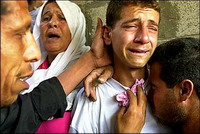People from all over the world grieve and vent online
Horrible, real-world happenings are unfolding almost simultaneously in the virtual world, as Virginia Tech students and people from all over the world gather online to grieve and vent.

Almost immediately after Monday's deadly shootings, Virginia Tech students created an "I'm OK" page on Facebook to let one another and their loved ones know that they survived. Other students posted photos and cell phone video on their own sites, or shared it just hours after the shootings with news organizations.
Since Monday, there has been a nonstop flood of postings on the popular Facebook student site, on MySpace and LiveJournal, and on personal blogs - expressing everything from grief to anger to confusion.
Jesse Connolly, a 21-year-old from Lynn, Massachusetts, made a posting Tuesday on the Myspace page of Ross Alameddine, one of the students who died. The pair worked together last summer at an electronics store in their home state.
"If only you were here to read this Ross... You'd know what an imaginative, intelligent, compassionate and most of all hysterically funny human being you were, and how appreciative I am to have spent last summer working with such a great kid," Connolly wrote. "My every thought is with you and your family."
Even before names of the victims were officially released, a few students created Facebook memorial pages for some of the dead - though others worried that it was too soon, since family and friends were still being notified.
There are myriad other ways the Internet continues to shape the grieving process.
In addition to using the university's Web site to communicate with the world, Virginia Tech officials planned to set up a site where families of the victims could post photos.
TechSideline.com, a site for Virginia Tech sports fans, also quickly morphed into a meeting place where students, family and friends could communicate - especially when phones were jammed.
And as a show of support, many students, including scores from other colleges, replaced their Facebook profile photos with a Virginia Tech logo shrouded in a black ribbon.
Patti Jacobs, a junior at Canisius College in Buffalo, New York, was among them. Saddened by the shootings, she went searching for memorial pages on Facebook on Tuesday morning.
Jacobs was alarmed when she also came across several pages that included hateful, sometimes racist remarks toward shooter Cho Seung-Hui, other Asians and his family.
"This is not about just one guy and his problems," Jacobs wrote. "Yes - he alone is accountable for all the damage and pain caused yesterday - but the reason for this was not his race, his child-rearing by his family or his girlfriend breaking up with him....
"How much of our society is accountable as well?"
Some of the hateful postings were removed, likely after other Facebook users flagged them - a process of communal self-editing used on some sites.
Those kinds of entries are a product of the open nature of the Internet, where rumors and inaccuracies also can linger.
Such was the case for 23-year-old Wayne Chiang, who was mistaken by some as the shooter - partly because his Facebook profile includes references to graduating from Virginia Tech and several photos of him with his gun collection.
At first, Chiang says he "played along with it" on his personal Web page, partly to see how much money he could make, since payment from the ads he places on his site are based on the number of hits the site gets. (He claims he's going to donate the proceeds to a fund for the shooting victims at his alma mater.)
Chiang decided to post the truth after he received death threats. But many of those who thought he was the shooter had the same question: Why did the killings happen?
"I always knew the Internet was very powerful, just not to this extent," Chiang, who lives in suburban Washington, D.C., said in a telephone interview.
"People just want to blame it on somebody in order to understand the situation. It's completely understandable."
Subscribe to Pravda.Ru Telegram channel, Facebook, RSS!





